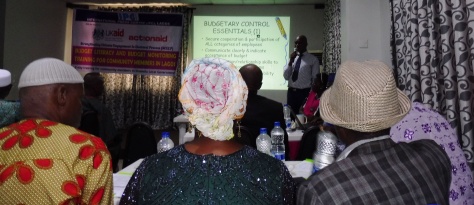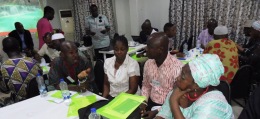-By ‘SANMI FALOBI & TOBI OYETUNDE
Community members from Lagos grassroot communities have been told that they can use budgetary provisions to engender development in their communities. This was the outcome from a 2-day budget literacy and monitoring training organized for leaders of community based groups from Boshoa, Orile Shomolu, Araromi Odo, Bashua and Bajulaiye areas in Shomolu local government, Lagos.
The two-day training which had experts on specific subject matter speaking to enlighten participants on what to know about engaging in budgeting process and monitoring the implementation of social provisioning targets in the budget at local and state levels was organized under the Strengthening Citizens in Electoral Processes (SCEEP) project being implemented in Lagos state by the International Press Centre (IPC) across six local government areas; Shomolu, Lagos Mainland, Surulere, Ifako Ijaiye, Ikorudu and Amuwon Odofin. The SCEEP project is with the support of Actionaid Nigeria and the UKAID/DFID.
According to the organizers, the broad objective of the training aims to broaden the knowledge of targeted community leaders/activists on the whole gamut of the budgeting process so that it can be used as an instrument of making government provide social facilities and development.
“Budgets can show if a government is pro-poor or pro-rich, based on what the budgeted money would be spent on which may have vary effects on different population groups. For example, a government that budgets more money for education, health care, roads, etc can be said to be pro-poor or pro-people”, Lanre Arogundade, Director, IPC stated.
“Budgets are factors in politics and political participation. The people have a right to be involved in the budgeting process, that is why overtime, trade unions, businesses, industries, civil society groups and other interest groups have always sought to be involved in the process and that is why this budget literacy training is being designed in such a way that community representatives can be in a position to make inputs into the budget of our local government or the state, and also be able to follow up the implementation, through monitoring and tracking”, he added.
“In summary, we want to be budget literate, to be a budget tracker and to be a budget monitor so that we can hold our government and leaders accountable and ensure good governance, by making sure that governments do what it says it would do in the budget, which is what accountability and transparency is all about”, he charged.
Taking participants through the rudiments of the budgeting process, Lere Oyeniyi from the Institute for Media and Society shared perspectives on the key concepts in budgeting and features/characteristics of a good budget, how to prepare budget using case studies of household budget, organizational budgeting and government budgeting processes, understanding the functions of budget as a tool for control, management, planning and social provisioning and the process in developing simple budgets to draw lessons on the inter-relation between allocation and utilization of resources in social provisioning, amongst others.

“Budgeting takes place in a human environment and it affects people’s behavior, depending on a number of factors such as: the way budget was drawn up, involvement in preparation or lack of it, manner of communication, education and training and the manner of implementation” he said. “A good budget should be motivating, challenging, based on Realistic Assumptions, prepared bottoms-Up & not Top Down, be detailed, measurable and assignable, be practical to implement, be attainable and be reviewable in the light of changing circumstances or reality”, he added.
In his own presentation, Micheal Awopetu from the Centre for Ethics and Cultural Orientation took participants through understanding the importance of budgets and how budgets are used in the planning of government administration including highlighting the different stakeholders in the budgeting process, with emphasis on how citizens can engage with the budget processes, viz-a-viz the key entry points for citizen’s engagement, as well as the concept of participatory budgeting, shared good practices from a rights-based approach for community engagement with all stages of the budget process.

“We should engage the budget at different levels and not just stay aside as if it does not concern you. When you speak out, your representatives can take your issues further, but when you don’t, they spend the money the way they like on your behalf” he said. “You can use the annual report by respective ministries to look at what is allocated to your community and how the budget affects you. Engagement with relevant officials and your representatives, lobbying, community participation through counter funding and physical inspection and monitoring of the stages of ongoing projects are tools that you should use to ensure that your community is not left out. You should not just rely on your representatives only, their personal aides and legislative assistants as well as other officers or appointees in government can be very instrumental in changing things” he added, amongst others.
According to Stanley Achonu, Senior Manager Projects of BUDGIT, there is a great need for citizens to engage the budgeting process to ensure effective execution.
He said, “you have to be involved in budget planning because it makes you participate in how government and tax payers money are being spent in a way that it will be beneficial to you. You have to stop complaining because complaining doesn’t solve any problem rather you should start acting and the action should be a peaceful and engaging one. The budget of a country is a law and it’s our duty as citizens of a country to inquire from our legislators to know what is allocated for our communities inside the budget.”
In addition, he made the people know that budget participation is a continuous process starting from budget planning to completion of the project.

“Budget involvement is a continuous thing, you start by engaging the Councilors and legislative members representing your constituency. Create and maintain a working relationship with your representatives, because they are the ones representing your interest both at the state and federal level. List your community needs in order of priority and present it to those representing you. Hold regular meetings with these people especially your counselors and these meetings should be peaceful and void of fight and riots.”
Participants at the training lauded the organizers in bringing the training to the grassroots,as it is a form of exposure and making the people know their right and how to be involved in budget process.
According to Peter Uche, a participants from Bajulaye: “the training is a very good one as it expose us to how to analyze and trace government budget. It also opened our eyes to knowing what to do as citizens when it comes to budget and also helps in enlightening other members of the community”.
Another participant, Toyin Badmus from Orile Shomolu, urged other participants in the training to always speak out whenever they are in need of anything from the government and they should channel their actions in the right way that the government will know they need certain infrastructures in their communities.








